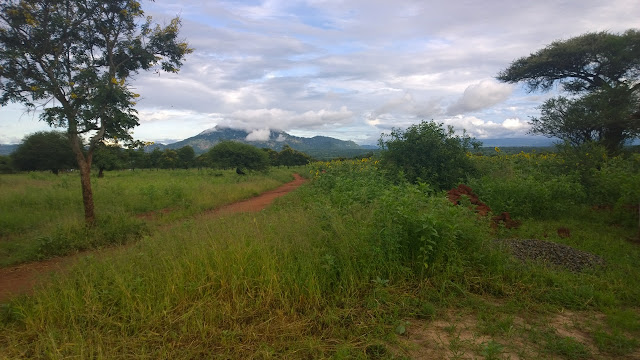Undesired Struggle

The Crocker Range in Malaysian Borneo - April 2010
"It feels like maybe I'm not being fully honest."
"When my students tell me they want to be Doctors or Lawyers or Leaders of course I say to them, 'Yes, you can do anything. . . Follow your dreams.' Quietly, I know that this is not really likely to happen if they stay here."
"Still, I try. Still, I teach."
The words hung in the air as a kampung chicken stuck his scrawny head into the humble classroom in which the English teacher and I were conversing. Children's voices broke the afternoon heat. "Bone from my bones and flesh from my flesh," they said in unison and in Malay. The Sunday School was having a lesson of their own as well.
Outside, a puppy chased flies over and around the pile of sandals just across the threshold from us. In the distance, women were hanging laundry out to dry over the carved railings of their raised porches and on lines strung up between banana trees. The few men that were there sat in the shade, the murmur of their voices fading into the humidity and the haze.
Located a couple thousand feet above sea level, over the Crocker Range and a couple hours inland from Kota Kinabalu, on the outskirts of a former lumber town, the setting for this conversation was a ministry center of the Basel Christian Church of Malaysia.
The rain forests that used to blanket the area have all but been eliminated - clear cut, ripped down, shipped off to Japan for processing and then washed around the world by an globalized wave of supply chains, products, and a voracious appetite for tropical timber.
Small clearings, like this one, are left in its wake - locations deemed undesirable by local populations.
In them live communities of migrants, like this one, from neighboring countries - peoples deemed undesirable by local populations.
Drawn to Sabah for economic gain, these migrant workers have, for decades now, come from the East and the Philippine archipelago and from the South and the Indonesian state of Kalimantan.
When times were good their children mixed freely in public schools with Malaysian nationals. Nowadays, however, they are regularly told that there is "no place" for them.
Trapped in this country between their parents' economic need and immigration law, the children find themselves to be technical citizens of lands in which they have never stepped foot and uncertain residents of a land in which they are not wanted.
Seeing their need, the Christian Churches have responded.
All throughout the area, 'centers' such as this one (the government would not allow them to be called schools), intended specifically for migrant children, have been constructed. And teachers, such as my colleague, have been commissioned to equip these migrant Children with a basic level of education.
While more can be done and more should be done - especially at the policy level - to address the injustices issued against these migrant children and their families, as I replay that distant conversation in that classroom, I can't help but note that my heart also goes out to the children's teachers:
Even as they worry about the long term prospects for their students . . .
Even with a socio-economic and political deck stacked against them and those they are seeking to assist . . .
They try. And they teach.
Day in and day out, they answer a call to serve 'the least of these' . . .
Day in and day out, even as they struggle, they faithfully persist.


Comments